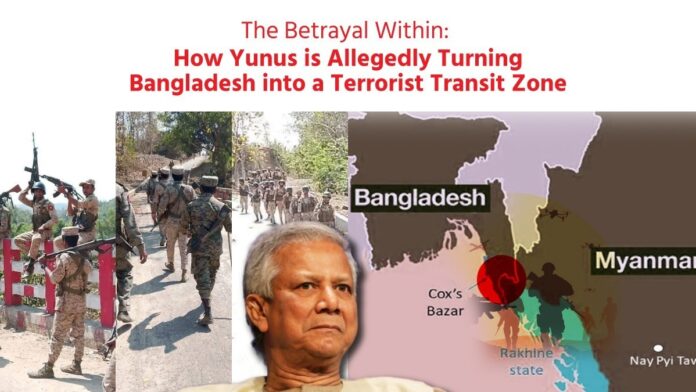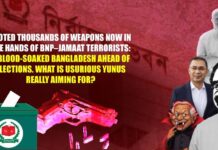Under the leadership of Dr. Muhammad Yunus, Bangladesh is reportedly falling prey not only to domestic turmoil but also to a far-reaching international conspiracy. Critics claim Yunus is aiding the rise of extremist groups and undermining democracy at home, while simultaneously allowing Bangladesh’s territory to be used to further the agenda of international terrorist networks.
While the global community expresses concern over Myanmar’s internal conflicts, Yunus is accused of actively supporting separatist elements—particularly in the Arakan region. Using border areas like Cox’s Bazar and Teknaf, these militant factions are allegedly receiving weapons, ammunition, and logistical support. What was once a sovereign frontier is now, some claim, a transit corridor for insurgents—with Yunus at the center of the operation.
The allegations do not stop at cross-border militancy. There are claims of a broader scheme involving Rohingya groups and fundamentalist factions being mobilized to destabilize India’s northeastern states—especially the sensitive “Seven Sisters” region. Such actions, if true, pose a grave threat to regional peace and are seen as efforts to rupture India-Bangladesh relations.
In a development that has further intensified controversy, Yunus is reportedly involved in a secret military deal with the United States, bypassing major regional powers such as China, India, and Russia. Construction is said to have already begun on a U.S. military installation in Shilkhali, Teknaf—a move critics argue is a direct violation of Bangladesh’s sovereignty and an act of national betrayal.
Observers warn that the Yunus-led administration is not only illegitimate but is also functioning as the epicenter of a broader anti-national conspiracy. Each action taken by this government, they argue, chips away at the foundation of the country’s identity and independence.
The call for resistance is growing louder.
Opponents urge immediate action to dismantle what they call Yunus’s “politics of national surrender.” “If we remain silent today, tomorrow there may be no sovereign Bangladesh left to defend,” reads one statement.
The message is clear:
Bangladesh is not a military base. Bangladesh is not a pawn on anyone’s political chessboard.
To safeguard national interests, the time to act, they insist, is now.





